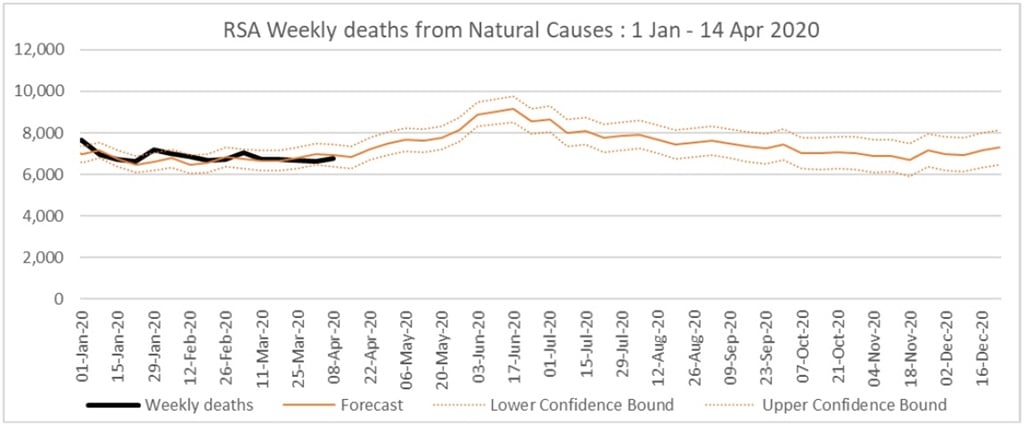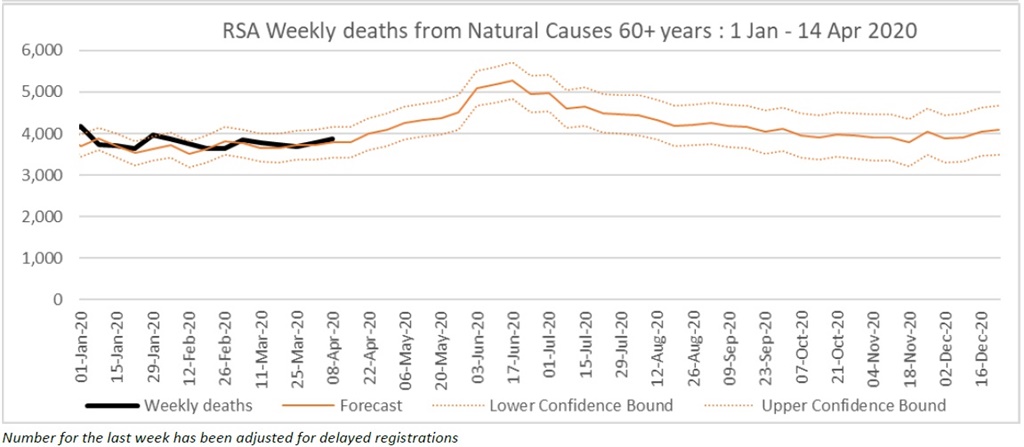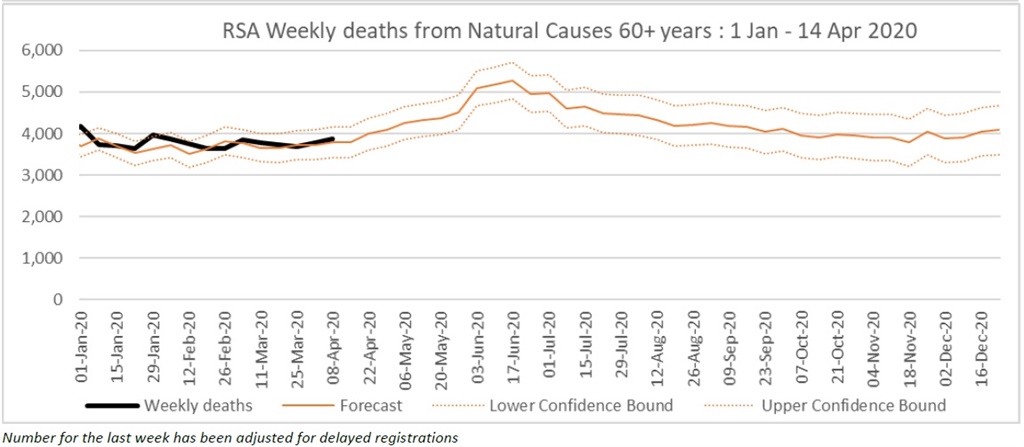Health Minister Zweli Mkhize struck a defensive tone during a marathon press briefing on Tuesday night, dismissing criticism over early projection models, surveys showing support for the Covid-19 lockdown had waned and the arrival of more than 200 Cuban doctors this week.
He gave a clear analysis in support of the lockdown, highlighting that it had pushed back the peak infection rate of Covid-19 to September, a key objective.
“The issue is when we started with the lockdown we wanted to slow down the viral infection. To suddenly open without putting in place the necessary mechanisms for limiting the spread… if you just go back to normal, we are actually going to go to an early explosion, which means you can have a rebound of infections quite quickly,” he said.
Mkhize said modelling had shown that extending the lockdown further would not have a substantial benefit on pushing the peak infection curve further back.
“The nature of the spread of the infection has not stopped completely because of the lockdown,” he added.
“The fact that we are not seeing as many deaths as in the rest of the world, does not mean it cannot happen in South Africa… I think we need to take it a little more seriously,” he said.
He defended the decision to bring in more than 200 Cuban doctors, saying their expertise in community-wide health would be key in the coming weeks.
Mkhize also dismissed criticism of early modelling around the coronavirus spread that informed discussions over lockdown measures in the first days of the outbreak in South Africa.
News24 reported that these early projections were cast aside in mid-March, and a team was assembled to prepare new, updated models.
READ | Battle stations: A team of top experts is being assembled to map the spread of Covid-19 in SA
His words come as the country’s hard lockdown comes to an end this week, with a mild easing of some restrictions related to the economy to come into effect on Friday.
Scientists around the world and in SA are also now grappling with the question of how to accurately measure the impact of the disease, with widespread concurrence that reported and confirmed Covid-19 cases was likely far off the mark in terms of the reality on the ground.
In SA, as of Tuesday night, 4 996 cases were confirmed and a total of 185 497 tests conducted. Six million people had been screened by nationwide screening and testing programmes.
Three new deaths were recorded in the Western Cape, the new epicentre of the outbreak in the country, bringing the total death toll to 93.
But this reflects deaths from known, hospitalised Covid-19 cases.
Scientists globally are moving to a new method of tracking potential coronavirus deaths and are increasingly finding a much higher number of fatalities than what is being attributed to Covid-19 officially.
While these numbers reported by various publications in recent days show higher than expected death rates in countries such as the US and the UK, for South Africa, it’s too early to tell, according to at least one top scientist.
Local data shows that deaths in South Africa have dipped below expected numbers as a result of the lockdown – there are less road traffic accidents and murders. Natural deaths are also showing a downturn, but are generally tracking within expected bounds.

Early tracking of mortality rates related to natural causes in South Africa during the coronavirus outbreak. (Source – SAMRC/UCT Burden of Disease Research Unit Weekly Report of 20 April 2020) (Click to enlarge)
But it would be premature to draw any conclusions, according to Professor Tom Moultrie, an actuarial scientist based at the University of Cape Town.
“Watch this space,” he posted on Twitter on Tuesday.
Moultrie has consulted with the New York Times on its reporting of higher than expected death rates, and is part of the Burden of Disease Research Unit at the University of Cape Town and the South African Medical Research Council (SAMRC) to produce similar analysis of mortality in South Africa.
Deaths
While scientists try to calculate accurate infection rates around the world, there have been warnings that the reported mortality rates could be too low.
Professor Cheryl Cohen, the co-head of the Centre for Respiratory Diseases and Meningitis at the National Institute for Communicable Diseases previously told News24 that it was widely accepted that the confirmed number of cases was underreported.
This means there were many more cases existing than what was known at any given moment in time, including a high percentage of possible asymptomatic cases.
What the comparative percentages are, Cohen could not say, as too much remains unknown.
Some scientists are trying to get a better picture by taking the total number of reported deaths overall reported by citizen registry bodies such as the Department of Home Affairs, and comparing those with expected numbers based on years of mortality data.

Early tracking of mortality rates in South Africa during the coronavirus outbreak for natural deaths in persons over the age of 60, a particularly vulnerable group of the population. (Source – SAMRC/UCT Burden of Disease Research Unit Weekly Report of 20 April 2020) (Click to enlarge)
The New York Times reported that more than 27 000 New Yorkers died since the start of the Covid-19 outbreak in the city in March. That was 20 900 people more than what was expected over the same time period, and thousands more than what has been officially confirmed as coronavirus deaths.
The Economist reported that mortality data collected by a group of epidemiologists under the name of EuroMOMO shows that there were 70 000 excess deaths more than expected between mid-March and mid-April.
The publication reported that in Italy and the Netherlands excess deaths tally double the official Covid-19 body count.
The Financial Times meanwhile reported that the global death toll could be as much as 60% higher than reported.
New tools
The SAMRC unit has built an analysis tool to provide insights into mortality data the SAMRC receives from the Department of Home Affairs on a monthly basis.
More recently, the data is being provided weekly – making more up to date analysis possible.
Mortality data can reveal this undercurrent of coronavirus impact. While it is not a scientific measure for coronavirus cases, it is a much clearer indicator of deaths during a local epidemic.
This is because a person who died does not necessarily need to have had Covid-19 for their death to be attributable to the virus.
An actuarial scientist who asked to remain anonymous as he is not authorised to speak with the media, explained to News24 that concern existed over the methods currently in use to measure cases of Covid-19.
Data published on an ongoing basis could be misleading, as many did not understand that it reflected infections from days prior to positive results and did not reflect absolute numbers of deaths.
In essence, he explained, there were four types of mortality that could be linked to Covid-19 – those who died directly as a result of the virus, as well as people who were not tested for Covid-19 prior to their deaths.
New York revised its death toll earlier this month to include a little more than 3 000 cases that had not been identified as Covid-19 cases prior to their deaths.
A third category were people who died as a result of other injuries but could not access healthcare because of hospitals being too full of Covid-19 patients, a scenario that did not yet apply to South Africa.
The fourth category were people who were already terminally ill and died during the outbreak, but whose deaths have no link to the coronavirus other than when they died.
Stay healthy and entertained during the national lockdown. Sign up for our Lockdown Living newsletter. Register and manage your newsletters in the new News24 app by clicking on the Profile tab




